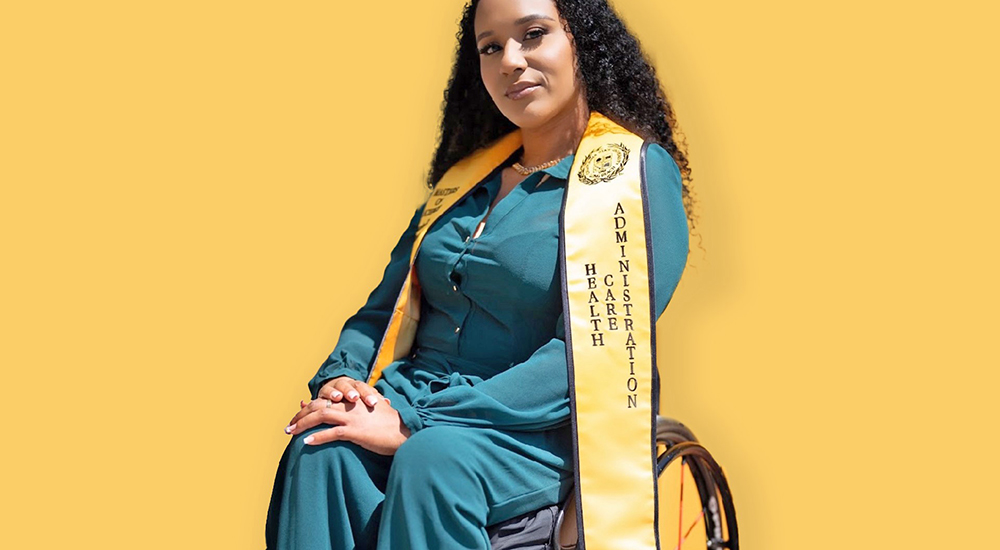On July 26, the United States recognizes the anniversary of the Americans with Disabilities Act (ADA). Signed into law in 1990, ADA acknowledges the important work that is furthering equal opportunities for persons with disabilities. Jamisa Hoare, EEO program manager for Greater Los Angeles VA (pictured above), shares how this legislation impacts her both at work and in her personal life.
Hoare began working at VA in 2013 through the Workforce Recruitment Program, which connects federal and private-sector employers nationwide with college students and recent graduates with disabilities and affords them the opportunity to obtain a summer internship or permanent job. Hoare lives with a spinal cord injury that restricts the use of her lower limbs and requires her to use a wheelchair for mobility.
“The ADA has provided me access to the benefits and privileges of employment. I can provide for myself financially and obtain health benefits to take care of my medical needs,” she said.
Act means we are valued just as much as people without disabilities
Hoare is able build a financial future for herself and for her future children and those who follow. The ADA also demonstrates that she matters, and people with disabilities matter.
“It demonstrates that we are seen, heard and valued just as much as people without disabilities. It means I am welcome in spaces where people with disabilities were once excluded. I can earn my bachelor’s and master’s degrees without barriers. I won’t have to leave a restaurant or other public gathering spot with friends and family early because there aren’t any accessible restrooms,” she said.
Hoare also serves as a point of contact for Greater Los Angeles staff to report allegations of sexual assault and harassment, and to ensure managers and supervisors are complying with the harassment prevention policies and regulations when allegations are reported.
“My work is closely tied to sexual assault and harassment prevention. I am responsible for training staff and managers in their roles and responsibilities for allegations of this nature. All VA initiatives to prevent and end sexual assault and harassment are directly related to the ADA because of its explicit inclusion of disability as a protected category. The largest minority group in the U.S. is the disabled community. The ADA helps to recognize and to provide protections for people with visible and hidden disabilities,” she said.
Personally harassed? “Yes. Many times.”
When asked if she has ever experienced an instance of harassment personally, Hoare responded with an emphatic, “Yes, of course. Many times.” She has been the subject of offensive jokes, asked to race in her wheelchair in the halls and other invasive commentary.
“I am a person, not a racecar,” she added. “There have been other times when people have walked past me and then pretended that I rolled over their foot as a joke. I never understood the humor in that. These types of behaviors remind me of high school bullying.”
Hoare explains that people often assume she is comfortable discussing her disability and that she is open and at peace mentally to discuss experiences that a reasonable person would consider traumatic. Questions like these are offensive to people with disabilities. It’s not polite to ask someone to reveal such private information, especially if you don’t know them personally.
Despite the ADA’s importance, Hoare says more work needs to be done before the disabled community is treated equitably and all places are accessible and welcoming to people with disabilities. “The passing of the law was a significant step in the direction of inclusivity, but nothing will really change until society’s perception of people with disabilities changes,” she said.
Bystander Intervention Training provides tools and techniques to respond
For anyone who has experienced any form of discrimination, harassment or sexual assault, Hoare recommends speaking up and saying something to someone. There are formal processes in place to address these types of allegations, but they will only be effective if experiencers inform their supervisor, EEO team, HR, union representative, VA police or a harassment prevention coordinator.
“Managers and supervisors cannot be everywhere at once, so we rely heavily on the experiencers and witnesses to come forward and say something. If you don’t feel confident standing up to the individual engaging in the conduct right away, report it to someone you feel confident speaking with, then take Bystander Intervention Training to feel more confident in the future,” she said.
VA’s Bystander Intervention Training provides tools and techniques to respond if employees or Veterans witness harassment or sexual assault at VA. If you have experienced inappropriate or offensive behavior of any kind, please do not hesitate to reach out for help immediately.
For more information visit VA’s Assault and Harassment Prevention Office.
Topics in this story
More Stories
Study underscores important role COVID vaccination can have in protecting Veterans from infection and reducing long-term health consequences
Columbia VA’s robotic surgery teams completed their 800th robotic surgery and are on schedule to hit 1,000 by the end of the year.
In a decentralized clinical trial, Veterans can participate from their own homes or local VA instead of having to travel to a research site.







Excellent article